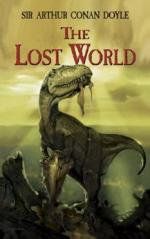It was indeed evident that this man stood apart from the others, and that they never ventured to address him without every sign of deep respect. He seemed to be the youngest of them all, and yet, so proud and high was his spirit that, upon Challenger laying his great hand upon his head, he started like a spurred horse and, with a quick flash of his dark eyes, moved further away from the Professor. Then, placing his hand upon his breast and holding himself with great dignity, he uttered the word “Maretas” several times. The Professor, unabashed, seized the nearest Indian by the shoulder and proceeded to lecture upon him as if he were a potted specimen in a class-room.
“The type of these people,” said he in his sonorous fashion, “whether judged by cranial capacity, facial angle, or any other test, cannot be regarded as a low one; on the contrary, we must place it as considerably higher in the scale than many South American tribes which I can mention. On no possible supposition can we explain the evolution of such a race in this place. For that matter, so great a gap separates these ape-men from the primitive animals which have survived upon this plateau, that it is inadmissible to think that they could have developed where we find them.”
“Then where the dooce did they drop from?” asked Lord John.
“A question which will, no doubt, be eagerly discussed in every scientific society in Europe and America,” the Professor answered. “My own reading of the situation for what it is worth—” he inflated his chest enormously and looked insolently around him at the words— “is that evolution has advanced under the peculiar conditions of this country up to the vertebrate stage, the old types surviving and living on in company with the newer ones. Thus we find such modern creatures as the tapir—an animal with quite a respectable length of pedigree—the great deer, and the ant-eater in the companionship of reptilian forms of jurassic type. So much is clear. And now come the ape-men and the Indian. What is the scientific mind to think of their presence? I can only account for it by an invasion from outside. It is probable that there existed an anthropoid ape in South America, who in past ages found his way to this place, and that he developed into the creatures we have seen, some of which”—here he looked hard at me—“were of an appearance and shape which, if it had been accompanied by corresponding intelligence, would, I do not hesitate to say, have reflected credit upon any living race. As to the Indians I cannot doubt that they are more recent immigrants from below. Under the stress of famine or of conquest they have made their way up here. Faced by ferocious creatures which they had never before seen, they took refuge in the caves which our young friend has described, but they have no doubt had a bitter fight to hold their own against wild beasts, and especially against the ape-men who would regard them as intruders, and wage a merciless war upon them with a cunning which the larger beasts would lack. Hence the fact that their numbers appear to be limited. Well, gentlemen, have I read you the riddle aright, or is there any point which you would query?”




